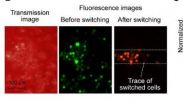(Press-News.org) Social work researchers from the University of Washington have found that among a group of active-duty Army personnel who use illicit drugs, the most abused substance is synthetic marijuana, which is harder to detect than other drugs through standard drug tests.
The research will be published in the July 2014 issue of Addictive Behaviors, but is already online.
Synthetic marijuana, sometimes called "Spice," is made with shredded plant material coated with chemicals that are designed to mimic THC, the psychoactive compound found naturally in marijuana. The U.S. Drug Enforcement Administration has listed several of synthetic marijuana's main compounds as Schedule 1 substances, making them illegal. But producers of the drug keep synthesizing new compounds to try to get around those bans.
"Because the formulation is constantly changing, one batch could be innocuous while the next batch affects you totally differently and you land in the hospital with seizures," said Tom Walton, project director for the UW study and a research coordinator in social work. "So the health effects are very unpredictable."
Those health effects have not been widely studied yet, but emergency rooms have reported seizures, nausea, vomiting, and cardiovascular and respiratory problems. Psychological effects of using synthetic marijuana can include anxiety, confusion, agitation, irritability, depression and memory issues.
The U.S. military has banned synthetic marijuana in all branches of the service.
Participants in the UW study came from the Department of Defense-funded Warrior Check-Up, a telephone-based intervention trial for Army personnel with untreated substance use issues who are ambivalent about making changes or engaging in treatment. All participants were stationed at Joint Base Lewis-McChord in Washington state at some point during the 2011-2014 recruitment period.
Nearly one-third said they had used illicit substances within the previous 90 days; 38 percent of those used synthetic marijuana, twice as many as had used regular marijuana.
Study participants told researchers they believed that use of synthetic marijuana was significantly higher in the military than in the civilian population. It was the only substance that soldiers believed they used more than civilians, which supports the idea that synthetic marijuana is particularly attractive to military personnel, the researchers said.
"What we think other people do tends to be important in prevention efforts and intervention efforts," said Denise Walker, lead author of the study and a UW research associate professor of social work. "If soldiers think it's common for military personnel to use Spice, then they might think it's OK to use it."
Walker said soldiers tend to avoid treatment for substance abuse issues because seeking treatment automatically goes on their record.
"Who would sign up for that in the civilian population if your boss and your coworkers will immediately know?" Walker said.
The Warrior Check-Up is not considered treatment, and participation is strictly confidential.
Users of synthetic marijuana were younger and less educated than those who were dependent only on alcohol. They were more likely to be single and earned less money than those who were dependent on other drugs or alcohol. But there were no differences in ethnicity, race, deployment history or religion. Researchers also found that synthetic marijuana users were two-and-a-half times more likely to develop drug dependence than those who used other drugs (but not alcohol).
The majority of participants believed their use of synthetic marijuana resulted in failing to meet obligations, such as being late for work, doing their job poorly, or not handling home and child care responsibilities well.
One hazard of using synthetic marijuana was needing more and more to get the same effect, a hallmark of drug dependence. More than three-quarters of users reported using it for much longer than intended (i.e., planning to take just a few puffs after work, but then smoking it for hours).
Walker said there are many reasons why someone would become dependent on alcohol or drugs, but soldiers face added stressors.
"They live very stressful lives. Most of them are young, and they may be going to war or coming back from war," she said. "Being in the Army is very demanding."
The military recently announced that it has developed a urinalysis that can detect synthetic marijuana, but Walton said that test doesn't necessarily have a very high success rate.
"Those drug tests aren't identifying all the users out there," he said. "And, unfortunately, because of the consequences of self-reporting to substance use treatment, positive drug tests are the primary reason soldiers enter treatment. The Warrior Check-Up hopes to change that by helping military personnel change their substance use before it negatively impacts their lives and careers."
INFORMATION:
Co-authors are Adam Pierce, Lyungai Mbilinyi, Debra Kaysen and Roger Roffman of the UW; and Clayton Neighbors of the University of Houston. The study was funded by the Department of Defense.
For more information, contact Walker at ddwalker@uw.edu or 206-543-7511, or Walton at towalton@uw.edu or 206-543-7511.
Department of Defense grant: W81XWH-09-2-0135.
Army drug users twice as likely to use synthetic marijuana as regular marijuana
2014-05-08
ELSE PRESS RELEASES FROM THIS DATE:
Single cell genome sequencing of malaria parasites
2014-05-08
SAN ANTONIO, May 8, 2014 – A new method for isolating and genome sequencing an individual malaria parasite cell has been developed by Texas Biomed researchers and their colleagues. This advance will allow scientists to improve their ability to identify the multiple types of malaria parasites infecting patients and lead to ways to best design drugs and vaccines to tackle this major global killer. Malaria remains the world's deadliest parasitic disease, killing 655,000 people in 2010.
Malaria parasite infections are complex and often contain multiple different parasite genotypes ...
New genomics technique could improve treatment and control of Malaria
2014-05-08
Single-cell genomics could provide new insight into the biology of Malaria parasites, including their virulence and levels of drug resistance, to ultimately improve treatment and control of the disease, according to new research funded by the Wellcome Trust and the National Institutes of Health.
The findings are revealed in a study by researchers at the Texas Biomedical Research Institute and published today in the journal Genome Research.
Malaria infections commonly contain complex mixtures of Plasmodium parasites which cause the disease. These mixtures, known as multiple ...
Open science journal publishes attempt to reproduce high-profile stem cell acid bath study
2014-05-08
In a study published today in F1000Research, Professor Kenneth Lee of the Chinese University of Hong Kong reveals the full experimental results of an attempt to replicate a controversial study published in Nature recently that suggested that bathing somatic cells in acid can reprogram them to induced pluripotent stem cells (iPS cells). With systematically collected and fully available data, Lee and his colleagues report that carefully replicating the original acid-treatment method does not induce pluripotency in two types of mouse somatic cells, including those used in ...
NASA sees system 90E moving toward southwestern Mexico
2014-05-08
A tropical low pressure area known as System 90E is located a couple of hundred miles southwest of Zihuatenejo, Mexico today and was seen by NASA's Terra satellite on its way to a landfall.
The Moderate Resolution Imaging Spectroradiometer (MODIS) instrument aboard NASA's Terra satellite captured a visible image of System 90E on May 7 at 18:50 UTC/ 2:50 p.m. EDT as it headed to a landfall in southwestern Mexico. The low appeared disorganized as it approached the southwestern coast of Mexico near the states of Michoacan and Guerrero.
According to NOAA's National Hurricane ...
Recycling a patient's lost blood during surgery better than using banked blood
2014-05-08
Patients whose own red blood cells are recycled and given back to them during heart surgery have healthier blood cells better able to carry oxygen where it is most needed compared to those who get transfusions of blood stored in a blood bank, according to results of a small study at Johns Hopkins.
In a report for the June issue of the journal Anesthesia & Analgesia, the researchers say they found that the more units of banked blood a patient received, the more red cell damage they observed. The damage renders the cells less flexible and less able to squeeze through a ...
Few women at high-risk for hereditary breast and ovarian cancer receive genetic counseling
2014-05-08
Mutations in the BRCA1 and BRCA2 genes account for nearly 25 percent of hereditary breast cancers and most hereditary ovarian cancers, yet a study by cancer prevention and control researchers at Virginia Commonwealth University Massey Cancer Center suggests an alarmingly small amount of women who qualify for BRCA genetic counseling actually receive the services. Additionally, they found that a significant proportion of women with a family history of breast and ovarian cancer underestimate their own risk.
The study, published in the April edition of the Journal of Community ...
Anti-aging factor offers brain boost too
2014-05-08
A variant of the gene KLOTHO is known for its anti-aging effects in people fortunate enough to carry one copy. Now researchers find that it also has benefits when it comes to brain function. The variant appears to lend beneficial cognitive effects by increasing overall levels of klotho in the bloodstream and brain.
What's more, the improvements in learning and memory associated with klotho elevation aren't strictly tied to aging. They do occur in aging mice, but also in young animals, according to a report published in the Cell Press journal Cell Reports on May 8th. ...
What vigilant squid can teach us about the purpose of pain
2014-05-08
Most of us have probably felt that lasting sense of anxiety or even pain after enduring some kind of accident or injury. Now, researchers have the first evidence in any animal that there may be a very good reason for that kind of heightened sensitivity—or at least there is in the battle of squid versus fish. Squid that behave with extra vigilance after experiencing even a minor injury are more likely to live to see another day, according to a report appearing in the Cell Press journal Current Biology on May 8.
The findings suggest that behaviors that appear counterproductive ...
Antibiotic resistance genes are essentially everywhere
2014-05-08
The largest metagenomic search for antibiotic resistance genes in the DNA sequences of microbial communities from around the globe has found that bacteria carrying those vexing genes turn up everywhere in nature that scientists look for them. The findings reported in the Cell Press journal Current Biology on May 8 add to evidence showing just how common and abundant those resistance genes really are in natural environments.
This big-picture, ecological view on a growing healthcare concern emphasizes the important relationship between antibiotic resistance in the clinic ...
New technology using florescent proteins tracks cancer cells circulating in the blood
2014-05-08
After cancer spreads, finding and destroying malignant cells that circulate in the body is usually critical to patient survival. Now, researchers reporting in the Cell Press journal Chemistry & Biology have developed a new method that allows investigators to label and track single tumor cells circulating in the blood. This advance could help investigators develop a better understanding of cancer spread and how to stop it.
Cancer spread, or metastasis, leads to up to 90% of cancer deaths. Investigators currently do not have the clinical capability to intervene and stop ...

